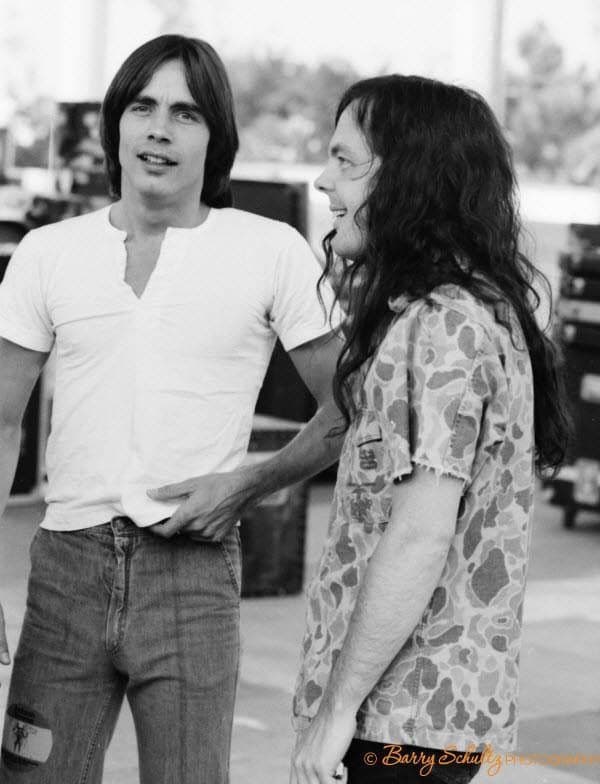
An existential sigh of acceptance for life’s complicated journey, urging one to relax and enjoy the ride.
When the song “Take It Easy” drifts through the air, most people’s minds immediately conjure the bright, jangly, country-rock energy of The Eagles’ 1972 breakthrough hit. But for those of us who came of age with the introspective brilliance of Laurel Canyon, the true, reflective spirit of the song belongs just as much to its co-writer, Jackson Browne, and his long-time musical companion, the late, great David Lindley. Their version, featuring Lindley’s distinctive and soulful electric guitar work, appeared on Browne’s remarkable second album, For Everyman, which was released in 1973.
The Quiet Path of the Original Architect
It’s a crucial piece of musical history that Jackson Browne started writing “Take It Easy” for his own debut album, but found himself stuck on the second verse. The search results confirm that Browne’s neighbor in the Echo Park apartment building he lived in—a young man named Glenn Frey—helped him finish the song. Frey, who would soon become the frontman for The Eagles, contributed the now-iconic, observational lines: “Well, I’m a-standin’ on a corner in Winslow, Arizona / Such a fine sight to see. It’s a girl, my Lord, in a flatbed Ford, slowin’ down to take a look at me.” This collaboration, born of neighborly chat, is how the song ended up as the smash first single for The Eagles in May 1972, soaring up the charts to a peak position of No. 12 on the Billboard Hot 100.
In contrast, Browne’s own recording of the song, released the following year, was never intended as a single and consequently failed to garner any significant chart success. His interpretation is not a pop anthem of abandon, but a somber, world-weary meditation. The version on For Everyman is notable for featuring multi-instrumentalist David Lindley on electric guitar and Sneaky Pete Kleinow on pedal steel. Lindley, who became Browne’s essential foil throughout the ’70s, brought a soulful, almost melancholic texture to the track, perfectly complementing Browne’s trademark, contemplative tenor. This recording closes out the first side of the album, with its fade-out cross-fading directly into the next track, “Our Lady of the Well,” tying the album’s themes together in a deeply satisfying way for listeners who truly appreciated the “album as art” concept of the era.
A Deeper Meaning for Everyman
The difference between the two most famous versions isn’t just in the banjo (The Eagles’ version had a prominent one) or the lead vocal; it’s in the underlying philosophical weight. Where The Eagles’ track is a party invitation—a carefree burst of youthful freedom—Jackson Browne’s is a spiritual instruction. His voice, even at 25, possessed a depth of weariness that critics noted, lending his delivery an authentic, world-weary weight.
The core of the song’s meaning, especially in the context of Browne’s overall body of work from that period, is an acknowledgment of life’s complications and a profound plea for self-compassion. The lyric: “I got seven women on my mind / Four that want to own me, two that want to stone me / One said she’s a friend of mine” perfectly encapsulates the existential troubles of a young man caught between competing desires, expectations, and the need for simple, platonic connection. The chorus—”Take it easy, take it easy, don’t let the sound of your own wheels drive you crazy”—is Browne’s instruction to himself and to us all: amidst the chaos of a complicated world and inner turmoil, the only reasonable response is a deliberate slowing down, a conscious choice not to let your own anxieties (“the sound of your own wheels”) consume you. It’s an act of mature resignation, urging you to “Lighten up while you still can,” a phrase that resonates with a quiet, powerful wisdom when sung in his voice, perfectly framed by Lindley’s expressive and poignant string work.
For those of us who heard it as the album track and not just the radio hit, the Jackson Browne and David Lindley rendition remains a timeless reminder to be gentle with our younger selves—the ones on the road, “tryin’ to loosen my load,” and to accept the journey, flaws and all. The song is a warm, wistful hug from an old friend, urging us to simply take it easy.